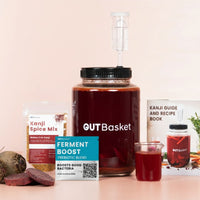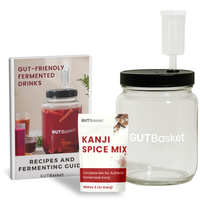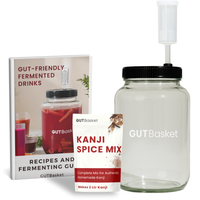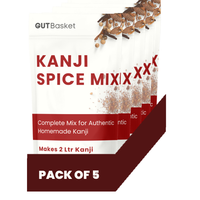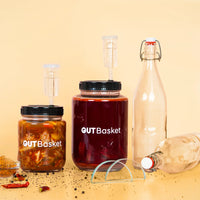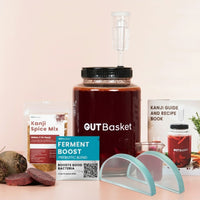While the benefits of fermented foods are generally accepted, there are probiotic manufacturers who suggest the probiotic benefit of these foods is over exaggerated. The common argument is that the bacteria contained in fermented foods are not able to survive the harsh environment of the digestive system and therefore aren’t beneficial to you.
This is simply not true.
The research supporting the widespread benefits of fermented foods for the body are widely accepted by scientists, doctors, and practitioners. Fermented foods improve your health in many categories, including:
- Composition of the gut microbiome
- Mental health1
- Hashimoto Thyroiditis
- Insulin sensitivity
- Organ transplant success
- Allergies
- Cardiovascular risk
- Inflammation2
- Wound healing
- Cholesterol metabolism
- Immunomodulation3
- Cognitive function4
- Peptic ulcers
- Gastric cancer5
- Autoimmunity
- Neurological disorders6
- LDL cholesterol levels
- Blood pressure
- Cancer7
This list comes directly from studies that specifically examine the effects of fermented foods on human health and is by no means comprehensive. There are tons of studies on the effects of fermented foods and their benefits to our health because they affect many mechanisms by influencing gut microbiome composition. Meaning, the bacteria present are able to survive the acidic environment of the gut8.
A Few Considerations on Fermented Foods and Probiotics
So, why are a few health authorities taking rogue positions when it comes to fermented foods and probiotics?
I believe the motivations for these attacks come from a place of frustration for the overreaching claims surrounding fermented foods and probiotics. I definitely agree there is somewhat of an evangelical attitude around fermented foods and probiotics. This has led to some people believing these are solutions to all health problems, which is why I created my Gut Rebuilding Program. However, the benefits of fermented foods are undeniable.
To ensure we maintain a balanced, unbiased view of fermented foods, probiotics, and their capabilities, let’s examine a few statements and determine whether they are true or not.
- The digestive system is a harsh environment. Yes, the gut has a very acidic pH of 1 to 2.5. However, depending on the location, gastric juice production, and contents of the gut this number can get as high as 79, which is neutral. Furthermore, this argument alone does not discredit the dozens of studies that observe beneficial bacteria level changes, which follows eating probiotic-rich foods.
- Probiotics found in fermented foods are acidophiles. Yes, this is true. They thrive in an acidic environment and have structures and metabolism that allows them to survive the stomach environment.
- All probiotics are created equal. This just isn’t the case. Many are made in the laboratory. Some probiotics are GMO (genetically modified organisms). Probiotics supplements are relatively new in terms of human evolution and definitely not all the same. What we do know about probiotics is that humans need lots of diversity in their intestines. Inside your gut is an ecosystem of flora and fauna similar to a healthy forest. Probiotic supplements aren’t very diverse. It is like killing off all the happy critters in the forest (antibiotics) and then releasing millions of bunnies, bats, and squirrels (probiotics) and expecting them to do all the rebuilding. They can’t do it. They are only part of a bigger ecosystem. Adding more bunnies, bats, and squirrels is not going to heal the forest and make all the animals come back again.
Furthermore, there is little to no regulation when it comes to the supplement industry.
These factors are why I recommend fermented foods over probiotic pills – if you can tolerate fermented foods. If you are going to use a probiotic supplement, it pays to use one that you know has been studied for its effects, like mine.
- All fermented foods contain probiotics. This is a misconception worth clarifying. It is possible for foods to be fermented and not contain probiotics. Beer, chocolate, vinegar, wine, bread, and coffee to name a few. Some fermented foods that did contain probiotics have been treated either by heat or some other process, which renders the probiotics inactive and useless.
As a general rule of thumb, you should always look for probiotic foods that claim to be raw and are never heated, canned or pasteurized. Learn about the ‘functional ferments’ so you know which ones are bonafide packed with probiotics.
The idea that all fermented foods and probiotics are beneficial to the gut microbiome is likely too black and white of a statement for many to swallow. Especially when you consider the above widespread declarations, it’s easy to see why someone might rebel against these claims.
Is the Gut Too Harsh for Fermented Foods?
The short answer is no.
Probiotic-rich fermented foods prove time and time again that they can change the composition of the gut flora, which demonstrates they are surviving. Every health benefit listed above is based on research specifically examining fermented foods.
One study10 even found fermented milk and yogurt was capable of increasing levels of the beneficial Bifidobacteria and Lactobacilli bacteria in the colon. Yogurt also significantly reduced levels of the enteropathogens E. coli and Helicobacter pylori.
Fermented food probiotics are likely more stable than probiotics in pills because they contain the food necessary for probiotic survival – prebiotics. I have been saying for years that it’s best to get your probiotics from fermented foods. Though there needs to be more studies comparing probiotic-rich fermented foods to probiotics in pill form, probiotics benefits are found in both fermented foods and supplements alike.
For over a decade I have been working with clients and recommending probiotic-rich ferments. After getting feedback from literally thousands of clients, the most common results people see is less constipation, better-digested stools, less sugar cravings, getting fewer colds and flus, more energy, and less bloating.
How to Get Probiotics in Your Diet
Make sure you’re getting real, high-quality probiotics in your diet by following these five guidelines:
- Opt for functional fermented foods over probiotic supplements when possible.
- When choosing fermented foods, be sure it says ‘raw’ on the packaging or has an indication that it wasn’t heated.
- Even better, make fermented foods yourself.
- If you do take probiotics, make sure they have a high CFU count and are from a reputable source like my Probiotic Power.
- Watch my free Gut Rebuilding webinar to learn how to fix the gut without making common mistakes.
- You can make your own probiotics in your kitchen when you take my Fermentationist Certification Program. Learn more in this webinar> The Science Behind a Better Belly.
When Probiotic Supplements are the Best Option
Some people have sensitivities to fermented foods. Here are a few times when probiotic supplements may be a better option:
- Having reactions to fermented foods, but not to probiotic supplements.
- Recently taken antibiotics or too many times and need to take megadoses of probiotics in order to recover digestive capabilities.
When Not to Eat Fermented Foods or Take Probiotic Supplements
There are a couple of health concerns where probiotics can create more havoc. Eventually, you will need to get probiotics in your diet somehow, but not when these reactions are happening:
- Histamine intolerance. I also call this ‘histamine overload.’ This is when the levels of histamine are too high in the system. This can be caused from many issues and I speak at great length about this in my Allergy Antidote training. Fermented foods and probiotics are contraindicated in this situation.
- SIBO – also known as Small Intestinal Bacterial Overgrowth. This state of dysbiosis is caused by antibiotic overuse and slow motility of the digestive system, which can happen from a variety of underlying lifestyle issues. When SIBO is present, fermented foods and probiotics are contraindicated.
Ongoing research is showing us the importance of caring for our gut microbiome. Learn how to become a steward for the ecosystem inside your body that is home to trillions of microbes. They need you and you need them.
Resources:
- https://www.ncbi.nlm.nih.gov/pmc/articles/PMC3904694/
- https://www.ncbi.nlm.nih.gov/pmc/articles/PMC4303846/
- https://www.ncbi.nlm.nih.gov/pmc/articles/PMC4854945/
- https://www.ncbi.nlm.nih.gov/pmc/articles/PMC5216880/
- https://www.ncbi.nlm.nih.gov/pmc/articles/PMC4958626/
- https://www.ncbi.nlm.nih.gov/pmc/articles/PMC3539293/
- https://www.ncbi.nlm.nih.gov/pmc/articles/PMC4844621/
- https://www.ncbi.nlm.nih.gov/pubmed/11157348
- https://www.ncbi.nlm.nih.gov/pubmed/3410329
- https://www.ncbi.nlm.nih.gov/pmc/articles/PMC5385025/
